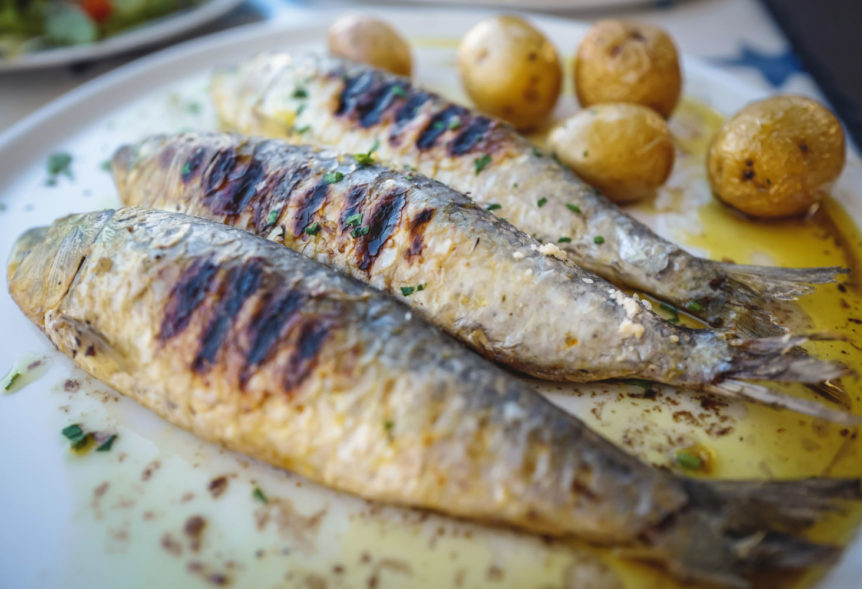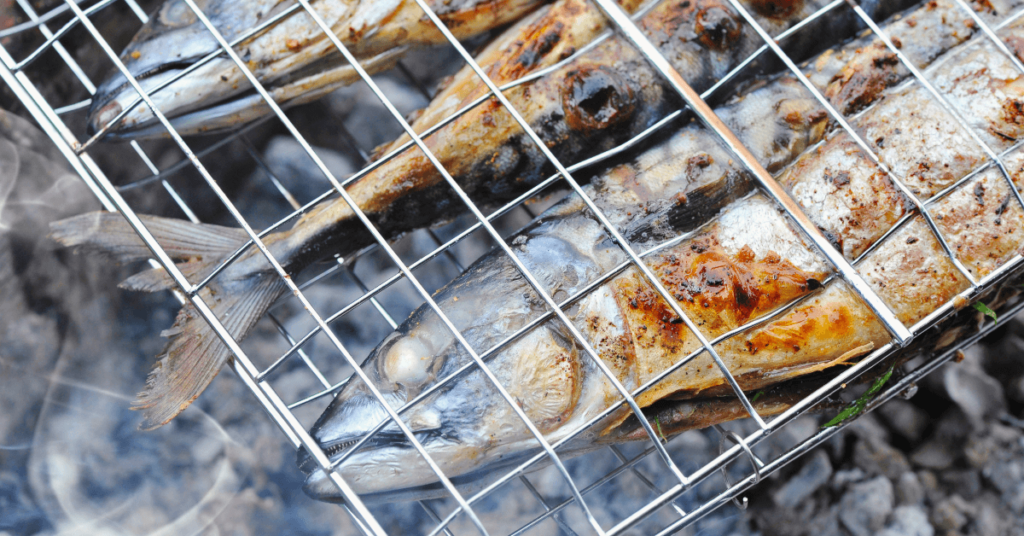
Fish, reeds, salt and fire. Little else is needed to prepare a sardine skewer or “espeto” from Málaga, Spain, a dish that has become a heritage element of Spanish culture. Its popularity has reached such high levels that even Google has dedicated one of its Doodles to it, a temporary alteration of the logo on the home page.
“A salty, smoky aroma in southern Spain can only mean one thing: espetos season. Today’s doodle celebrates the taste of summer, a popular Spanish dish of skewered sardines traditionally grilled over wood on the beach,” explained Google last week.
Moreover, this grilled fish aroma is how we want to welcome the summer season and embrace the most amazing months of the year!
How the typical sardine skewer is made
The espeto is a particular way of grilling fish. In the case of Málaga, most of the sardines are used, strung on rods and put on the fire. You only need fish, reeds, salt and fire for its preparation—a simple and quick recipe.
When threading them, it is essential to cross the back of the sardines. The fish must be placed equally on the rod. The concave part of the shank is turned upwards, and the tip is inserted into the back of the sardine at the level of the dorsal fin. This way, we will be skirting the spine without breaking it and exiting through the belly. Finally, salt is added, and they are nailed next to an olive wood fire.
Once you put them in the fire, you have to watch the direction of the wind. In this regard, the wind must go from the sardines to the flame to prevent them from scorching or smoking. Specialized organizations ensure that the ideal distance is about 20-30 centimetres. And in just over six minutes, we can enjoy this typical Malaga dish.
Along with anchovies, sardines are one of the quintessential bluefish in both Spain and Portugal. The fish provides a wide variety of nutrients. We love highlighting their lipid content and the contribution of omega-3 polyunsaturated fatty acids or proteins of high biological value.
What is an espeto?
The verb “espetar” refers to traversing meat, poultry, fish, etc., with a spit, or another pointed instrument, to roast them, as stated in the Royal Spanish Academy (RAE). Thus, the sardine skewer is precisely one of the typical dishes of southern Spain, in Andalusia, specifically Málaga, although it is also distinctive in Granada and Almería.
What’s the difference between espeto and sardine
The difference between the two terms, sardine and skewer, is that the first refers only to the type of fish used to make skewers, roasting it traditionally using the cane—skewered and olive wood.

The rich tradition of sardines in Spanish and Portuguese cuisines
Sardines have long held a special place in the hearts and palates of both Spanish and Portuguese cuisines. These small, oily fish are delicious and boast a rich history and cultural significance in the Iberian Peninsula. Particularly in Portugal, sardines are cherished, and their consumption is deeply rooted in tradition and local customs. Additionally, we will delve into the numerous health benefits of including sardines in your diet.
Sardines are a staple in both Spanish and Portuguese culinary traditions. Their versatility makes them ideal for various cooking methods, including grilling, frying, and pickling. They are often served as tapas in Spain, accompanied by crusty bread and wine. In Portugal, sardines take centre stage during the summer, when locals and tourists gather for vibrant festivals celebrating these little fish.
Check out our delicious Portuguese-style grilled sardines recipe!
Sardines in Portugal’s Algarve: A taste of authenticity
Regarding sardines, the Algarve region of Portugal holds a special place. Nestled along the country’s southern coast, the Algarve boasts a rich maritime heritage. Moreover, sardines have become synonymous with their culinary identity. In Algarvian villages and cities, such as Portimão and Olhão, you will find bustling sardine festivals known as “Sardinhadas.” These festivals bring together people from all walks of life to celebrate the bountiful harvest of fresh sardines.
-
 Napoleon Rotisserie Grill Basket75.00€
Napoleon Rotisserie Grill Basket75.00€ -
 Flexible grill Basket46.00€
Flexible grill Basket46.00€
During a typical Sardinhada, the air fills with the tantalizing aroma of sizzling sardines as locals grill them over open fires. These grilled sardines are then served with a simple accompaniment of boiled potatoes, roasted peppers, and a drizzle of olive oil. The Algarvians believe the best way to enjoy sardines is to keep them simple, allowing the fish’s natural flavours to shine. This authentic, rustic dining experience captures Portuguese culture’s essence and highlights these small fish’s incredible flavours.
Exploring the health benefits of sardines
Aside from their delicious taste and cultural significance, sardines also offer many health benefits. Rich in omega-3 fatty acids contribute to a healthy heart and brain function. These fatty acids also possess anti-inflammatory properties, aiding in reducing chronic diseases. Sardines are also an excellent source of vitamin D. This one plays a vital role in bone health and immune system function. Additionally, they provide a good dose of calcium, iron, and protein, making them nutritious for those looking to maintain a balanced diet.
-
 Napoleon Multifunctional Skewers30.00€
Napoleon Multifunctional Skewers30.00€ -
 Napoleon Rotisserie Shish-Kebab Skewer Set50.00€
Napoleon Rotisserie Shish-Kebab Skewer Set50.00€ -
 Dual Prong Skewers15.00€
Dual Prong Skewers15.00€ -
 PRESENTATION SKEWER RACK30.00€
PRESENTATION SKEWER RACK30.00€
Sardines hold a special place in the culinary traditions of Spain and Portugal. In Portugal’s Algarve region, the annual Sardinhadas celebrate these small fish, bringing communities together and showcasing their delicious simplicity. From the rich flavours to the numerous health benefits, sardines are essential to the Iberian Peninsula’s gastronomic heritage. So, whether you’re enjoying tapas in Spain or indulging in a Sardinhada in Portugal, savouring these little fish is an experience that captures the essence of these vibrant cultures.
Visit our showroom in Almancil, Algarve or contact us with any BBQ-related questions!